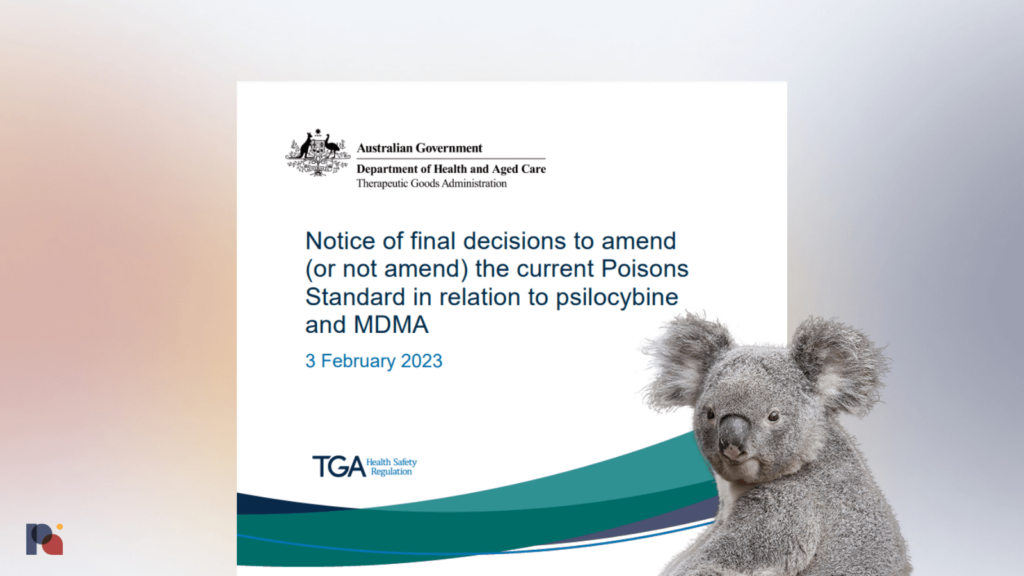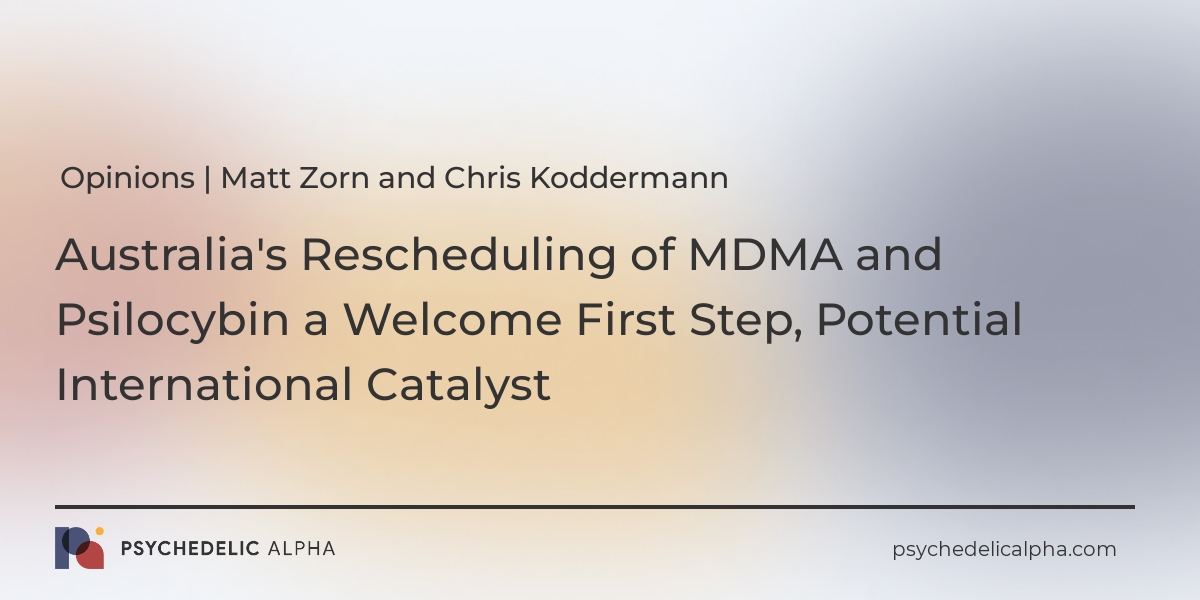In this Opinions piece, Matt Zorn and Chris Koddermann unpack last week’s surprise announcement from down under, which they hope will be a catalyst for similar efforts in other countries and internationally.
Last week, Australia’s Therapeutic Goods Administration (TGA) made an unexpected announcement. Effective July 1, 2023, psilocybin and MDMA will be added to Schedule 8, Australia’s list of Controlled Drugs, to permit the prescribing of MDMA for the treatment of post-traumatic stress disorder (PTSD) and psilocybin for treatment-resistant depression (TRD). The decision, which will also ease access to both drugs for use in clinical trials to treat PTSD and TRD, results from a rescheduling petition submitted by Mind Medicine Australia last summer. Notably, this marks a reversal from where the TGA had been in late-2022, when it issued an interim decision not to reschedule either substance. After an examination of expert reports and many thousands of public comments, the agency changed its mind, no doubt because of the current lack of options for patients with specific treatment-resistant mental illnesses.

In the short term, rescheduling will not make either substance widely available for use in treatment. Indeed, neither will likely be available at all come July 2023. The rescheduling is quite circumspect. It permits access by only approved psychiatrists under Australia’s Authorised Prescriber Scheme, and only for conditions where clinical evidence exists to support use. Further, a prospective prescribing psychiatrist must provide evidence and justification that a suitable treatment protocol exists. As of today, according to the TGA decision, there are no established treatment protocols. Numerous additional regulatory obstacles aside from the TGA classification must be sorted out before any qualified psychiatrist will be able to legally administer MDMA or psilocybin. Psilocybin and MDMA will also remain classified as Schedule 9 ‘Prohibited Substances’ for all other uses, including their use in research to treat other psychiatric, neurological, and neurodevelopmental disorders. While not prohibiting such research, this status will maintain regulatory barriers that add to the cost, complexity and duration of research efforts related to a range of other conditions.
Nonetheless, this is big news. By moving these compounds off Australia’s most restrictive schedule, even on this limited basis, Australia has made it easier to research these promising treatments for PTSD and TRD. And to our knowledge, Australia’s decision is a regulatory first: with the possible exclusion of medicinal cannabis, this is the first time a country has moved a compound to a less restrictive schedule before its approval as a or part of a pharmaceutical product.
“…some might say Australia jumped the gun. We disagree. The approval of medical-grade psychedelics to be used in assisted therapy is a matter of if, not when.”
For this reason, some might say Australia jumped the gun. We disagree. The approval of medical-grade psychedelics to be used in assisted therapy is a matter of if, not when. By reclassifying psilocybin and MDMA ahead of regulatory approval, Australia took the first step in an unwinding that will take considerable time. The move not only relaxes research barriers but allows the conversation over other indispensable aspects of psychedelic assisted therapy—such as treatment protocols, therapist qualifications, and infrastructure—to start from a place where limited administration of these novel therapies is possible. At the same time, by moving the two substances out of Australia’s research-only category in a very circumscribed manner, the country limited the downside risk of a rapid rollout.
As we watch to see how the Australian experiment unfolds, attention should also be focused on the rest of the world to see if it follows suit. If Mind Medicine Australia’s successful petition teaches us anything, it is that with enough organization and public participation, other pre-approval regulatory changes may be possible.
First, internationally. In most countries, restrictions on the medical and scientific use of psilocybin, MDMA, LSD and other psychedelics result from their status as Schedule I drugs under the 1971 UN Convention on Psychotropic Substances, one of three international drug control treaties. Based on a presumption that these drugs offer no medical benefit and pose a high risk of abuse, their Schedule I status requires signatory governments to prohibit all but very limited medical and scientific use. As a result, governments wishing to abide by their treaty commitments have little room to introduce regulatory changes designed to expedite research and increase patient access. Australia’s approach seems designed, at least in part, to keep within the bounds of these treaty obligations. While the magnitude of effect international rescheduling would achieve from country to country varies, the message it would send would be global. It would give signatory countries significant legal, political and evidentiary cover to explore and enact newer, more dynamic policies for a new wave of psychedelic treatments.
Second, in countries themselves. What took place in Australia could be replicated in other countries using analogous processes. Indeed, at least one process related to a rescheduling petition regarding psilocybin is pending in the United States.
The change in Australia is a welcome first step; we hope international and domestic regulators pay attention and follow suit.
Matt Zorn is a Partner at the law firm of Yetter Coleman LLP and writes on his newsletter On Drugs. Chris Koddermann is the founder and Managing Director of CURA Communications. In 2021, he co-founded the International Therapeutic Psilocybin Rescheduling Initiative, a coalition working to pursue and secure a rescheduling of psilocybin under the 1971 Convention on Psychotropic Substances.


